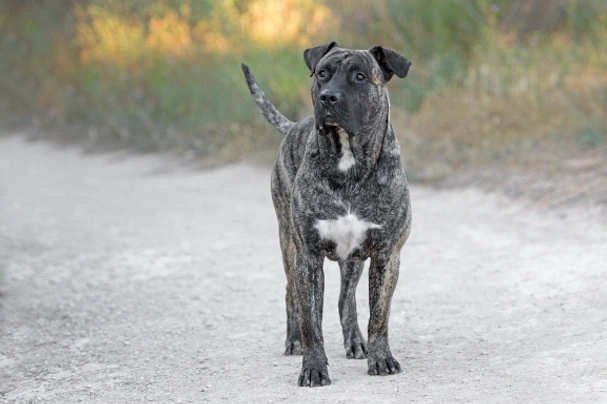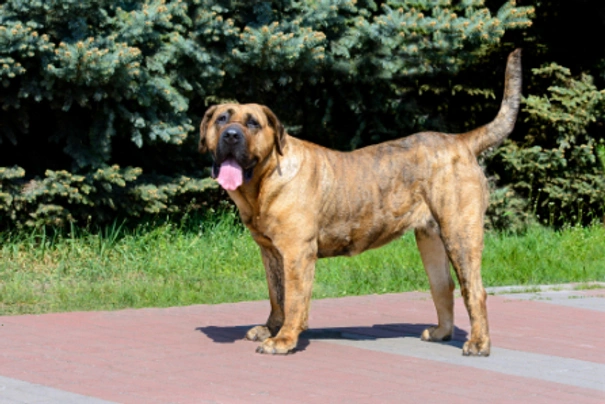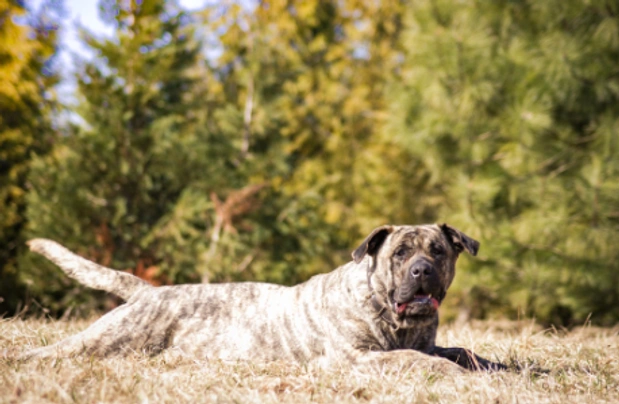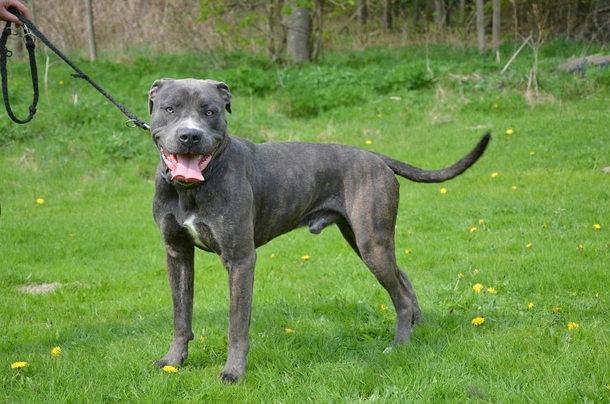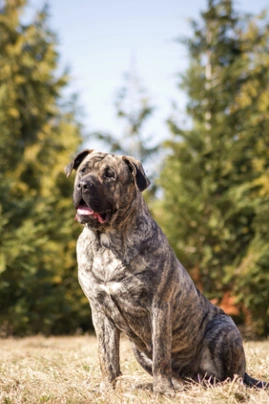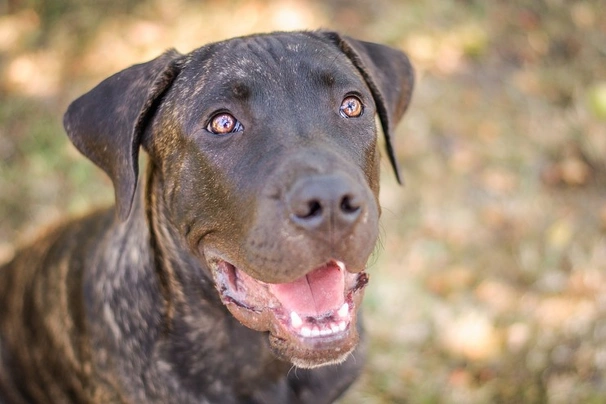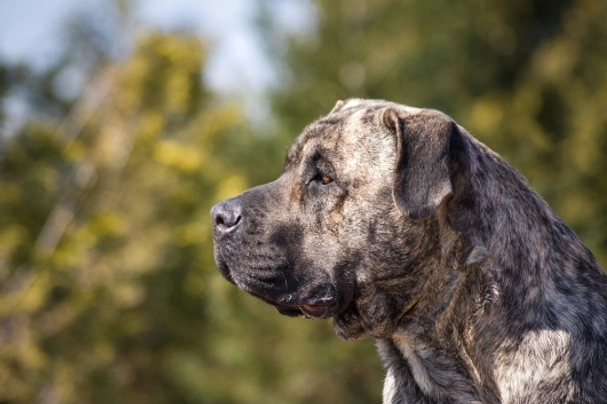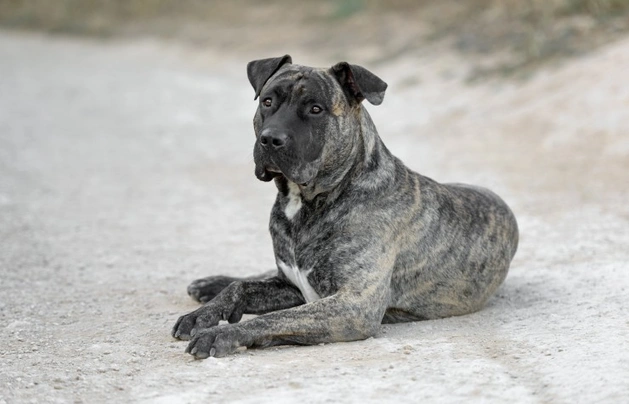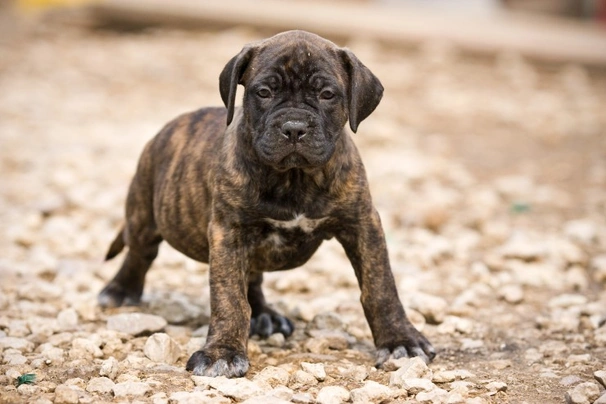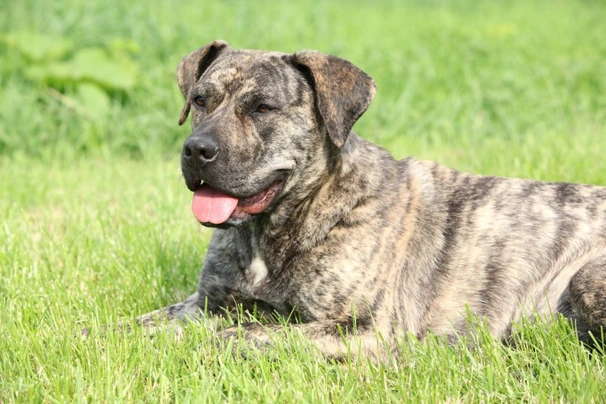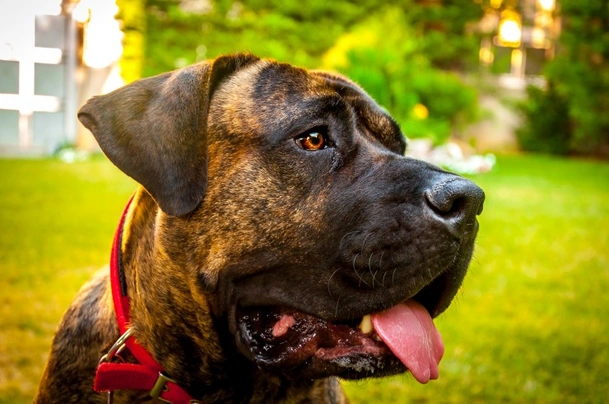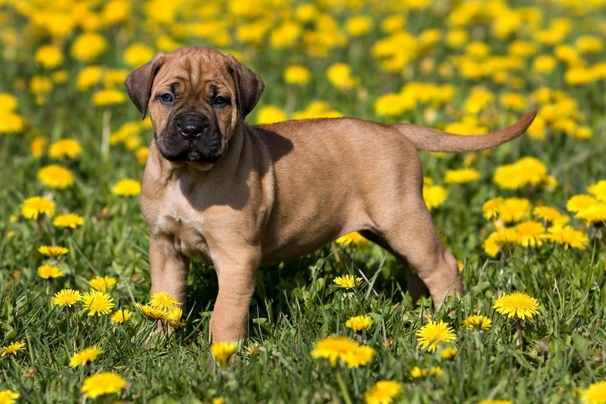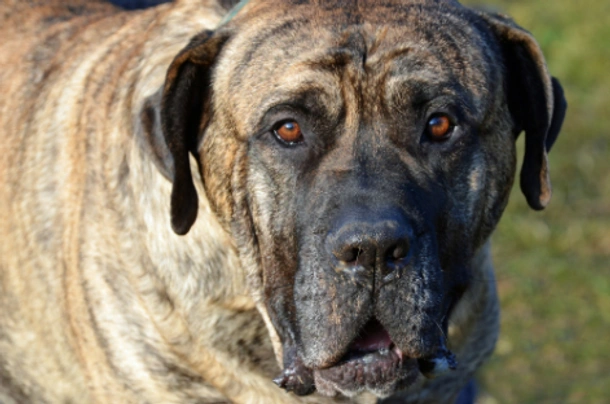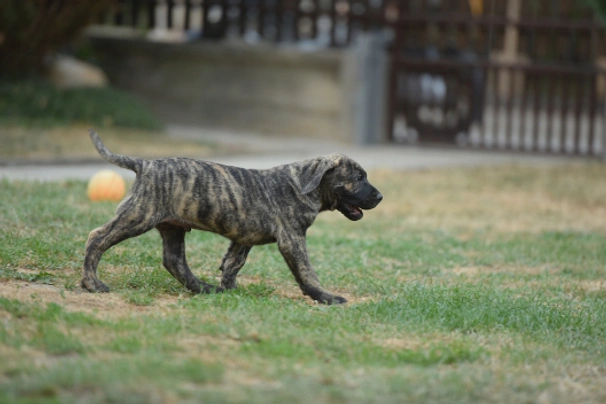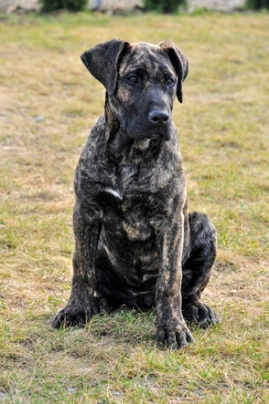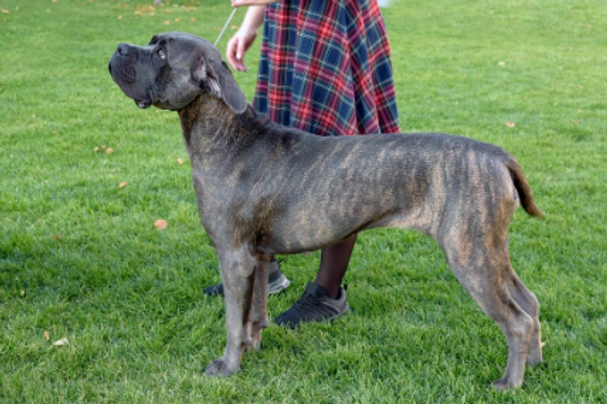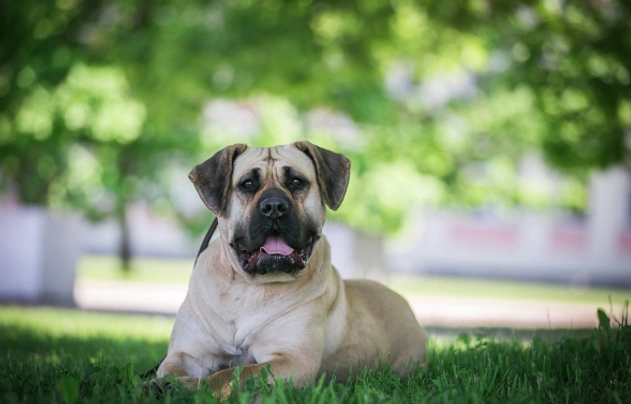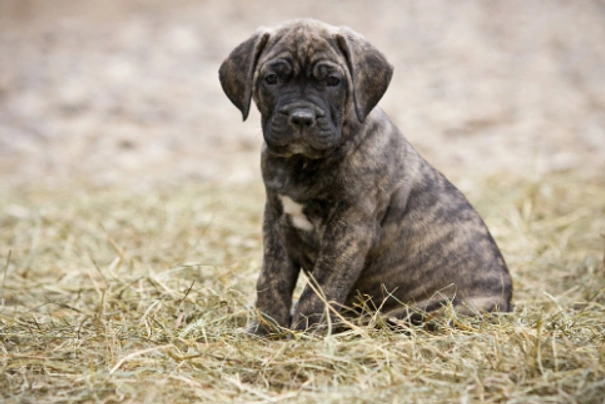Presa Canario
Pros
Cons
Introduction of the Presa Canario
The Presa Canario is an impressive powerful dog that looks very much like the Mastiff and it's thought that they may well have some English Mastiff in their ancestry. They are native to the Canary Islands where they were bred to work as farm dogs and although they might look imposing they are known to be affectionate and loyal characters that make excellent companions.
They are also renowned for being extremely good watchdogs that don’t need to be trained to protect because this is a trait that comes naturally to the breed. The Presa Canario is still popular in the Canary Islands but they are lesser known in the UK although they are among some of the more popular with people familiar with the breed. For the moment the Presa Canario is not a Kennel Club registered breed but they are recognised by the American Kennel Club and the United Kennel Club.
History of the Presa Canario
The Presa Canario was first bred in the Canary Islands as a working farm dog and it's thought they were developed during the 15th and 16th centuries when the Spanish conquistadores bought mastiffs-type dogs with them to the islands. They crossed their dogs with the now extinct Bardino Majero as well as other breeds which included the Iberian Presa Alanos-type bulldogs and English Mastiffs to produce a robust loyal and courageous working dog whether they were asked to protect livestock from prey guard property or wrangle cattle. It is also thought that Hispanic breeds like the Presa Espanol were also introduced into the mix too.
It was during the 18th Century that English traders merchants and colonist introduced their dogs to the Canary Islands. These were the dogs that predated Mastiffs and Bulldogs and which were known as Tiedogs and Bandogges. A little later other breeds were introduced to the islands by the English which included the Bull Terrier and Bulldogs which they proceeded to cross with the Perro de Presa a native breed that is now extinct although just how much these breeds eventually influence the Presa Canario remains unknown.
The Presa Canario proved to be popular fighting dogs right up until a law was passed banning the blood sport in the 1940's. Breed numbers dropped because of the ban and because other breeds were appearing on the scene which included the German Shepherd Dog and the Dobermann Pinscher both of which became an extremely popular choice as family pets and companions in the Canary Islands. This meant the Presa Canario was only really seen working on farms and as guard dogs rather than being chosen as a family pet or companion dog.
It was not until the 1970's that interest in the breed was revived when dedicated enthusiasts set about resurrecting the breed to be a strong very large outgoing confident and calm dog that boasted being extremely territorial and protective. The Presa Canario has always been renowned for defending his owner and property without ever backing down which is a trait that that has been highly prized in the breed.
In 1982 a breed club was established in the Canary Islands which was recognised by the Real Canine Society Central of Spain or RSCFRCE. These impressive dogs were subsequently recognised as being part of the American Kennel Club's Foundation Stock Service in 1996. The United Kennel Club recognised the Presa Canario in 2003 but these large and impressive dogs are yet to be accepted as a breed by The Kennel Club.
Today the Presa Canario has fast become a popular breed in the UK with breeders taking great care to produce good natured well-balanced healthy dogs that make wonderful family pets and companions. However anyone wishing to share their home with a Presa Canario would need to register their interest with breeders and agree to being put on a waiting list because very few puppies are bred every year. It’s worth noting that finding insurance cover for a Presa Canario can prove quite challenging too and the premiums tend to be a lot higher than for many other breeds.
Interesting facts about the breed
- Is the Presa Canario a vulnerable breed? No although the Presa Canario is considered a "rare" breed which means that anyone wishing to share a home with one would need to go on a waiting list for the pleasure of doing so. Currently the Presa Canario is ranked 89 out of 238 breeds on the Pets4homes website
- The Presa Canario is recognised as a breed by the United Kennel Club (UKC) under their original name of "Perro de Presa Canario"
- The breed is recognised by the American Kennel Club
- Records of the Presa Canario can be traced back to the 15th and 16th Century
- Some breeds have traditionally had their tails docked a practice that has been going on throughout time. In 1993 that a law was passed preventing anyone other than a vet from carrying out the procedure but this was further changed when The Animal Health and Welfare Act (Scotland) came into effect in 2006 which invoked a total ban on tail docking unless for medical reasons. In other parts of the UK the Animal Welfare Act came into effect in April 2007 which meant that dog's tails could no longer be docked unless they fell into the category of a specific "working" dog or for medical reasons providing the correct paperwork has been submitted by a qualified vet who would undertake to carry out the procedure. There is a heavy fine for anyone who has a dog’s tail docked without submitting the necessary paperwork to the right authorities
Appearance of the Presa Canario
Height at the withers: Males 60 - 65 cm Females 56 - 61 cm at the withers
Average weight: Males 50 - 59 kg Females 38 - 50 kg
The Presa Canario is a large and impressive dog and one that looks very much like an English Mastiff having the breed in their bloodlines. They have very large heads with their ears being set just above a dog's eye level. They have a well-defined stop and nice symmetrical wrinkles which are never too excessive. Their skulls are slightly dome shaped and broad and dogs have a deep median furrow and well-developed cheeks but not overly so.
Their muzzles taper slightly to the nose with the bridge being straight and flat. Their lips are quite pendulous and moderately thick being black in colour but dogs don't have pronounced flews. When seen from the front a dog's lips should give the impression of being an inverted "V" where they join in the centre. The Presa Canario has a strong jaw with either a scissor or a reverse scissor bite with some dogs having a level or a little undershot bite which is acceptable.
They have wide black noses and their eyes are a little oval shaped being set wide apart on a dog's head. Eyes can be a range of colours which includes medium through to dark brown so it matches a dog's coat colour but their eyelids are always black and tight fitting. The Presa Canario has a very well-muscled thick set neck with loose skin around the throat which forms a little bit of a dewlap. They have muscular well laid-back shoulders and strong powerful front legs that show a good amount of bone.
They are slightly longer in the body than they are tall at their wither and they have extremely broad deep chests with the female boasting a slightly longer body and less well sprung ribs than their male counterparts. Their withers are a little raised and they have strong backs and loins that are not overly muscled. Croups are moderately long being wide and a little sloping with females boasting slightly wider croups. Their loins are quite short deep and very muscular with dogs being moderately tucked up.
They have well arched ribs with briskets that drop down to the elbow. Chests are broad and deep with dogs having nicely developed pectoral muscles. They have powerful hindquarters with strong well-muscled back legs. Their feet are compact and round being very cat-like with a dog’s back feet being longer than their front feet. They have well developed paw pads and strong nails that match a dog's coat colour. Their tails are set moderately high being thicker at the base before tapering to the tip. Dogs carry their tails like a sabre when excited or alert but down when they are relaxed.
When it comes to their coat the Presa boasts having a single coat that lies flat to the body and which is harsh to the touch. The hair on a dog's withers and on the back of their hind legs is a little longer than on the rest of the body. The most commonly seen colours include the following:
- Fawn - any shade
- Black - any combination of black and brindle
- Brindle - any combination of brindle and black
A dog's face to have a dark brown or black mask but it must not go over a dog's eyes and Presas can have a white blaze or a white patch on their heads. Dogs can also have a small amount of white on their throats chests and toes.
Gait/movement
When a Presa Canario moves they do so with great purpose taking long and effortless strides and covering a lot of ground when they do. Presas hold their tails above their backs when trotting.
Faults
Prospective Presa Canario owners should be wary of any puppies or dogs that show any sort of exaggeration whether in their looks or conformation. A responsible breeder would always ensure that puppies they produce are of a good size and have conformation as well as calm temperaments. Males should have both testicles fully descended into their scrotums.
Temperament of the Presa Canario
Presas may be imposing and impressive to look at but they are known to be calm well-behaved and placid dogs that thrive in a home environment loving nothing more than to be included in everything that goes on around them. They are naturally suspicious of people they have never met before which is why they have always been highly prized as watchdogs in the Canary Islands.
With this said because the Presa Canario is a large and imposing dog they need to be trained correctly from a young age so they understand their place in the pack and who is the alpha dog in a household or they might take on this role. They are not the best choice for first time owners because they need to be handled and trained by people who are familiar with the needs of this type of large and dominant dog.
A puppy's training must start as soon as they arrive in their new home by teaching them the "basics" and the boundaries although a Presa may well test these throughout their lives which is why their training and handling must be consistent so that dogs understand what is expected of them. Once they have settled in to their new environment they form strong bonds with their owners and will naturally protect them should ever they feel their families are being threatened.
It cannot be stressed strongly enough the importance of socialising a Presa from a young age which must include introducing them to lots of new situations noises people other animals and dogs once they have been fully vaccinated so they grow up to be more relaxed outgoing mature characters. However because the Presa is naturally protective it's important to bear in mind that no matter how much socialisation they are given these dogs will want to guard and protect their owners and their property because it is deeply embedded into their psyche to do so.
Because they are so intelligent they need to be given lots of things to occupy their minds and they need enough daily exercise for them to be truly happy well-rounded dogs. If they are not given enough of either a Presa would quickly start to show signs of boredom which could result in their developing some unwanted and destructive behaviours around the home which is their way of relieving any stress they may be feeling and not necessarily because they are being naughty.
Are they a good choice for first time owners?
Presas are not the best choice for first time dog owners because as previously mentioned they are better suited to people who are familiar with their specific needs and who know how to train and handle such a powerful and intelligent dog.
What about prey drive?
The Presa Canario has a high prey drive and they are naturally protective and territorial too. As such care should always when they are around other animals and pets they don't already know. Care should also be taken as to where and when a Presa can run off the lead more especially if there are other dogs and animals around.
What about playfulness?
Presas may look intimidating but they have a very playful side to their natures and love to entertain and be entertained by the people they love. With this said puppies and young dogs need to be taught how to "play nicely" so that they don't end up knocking anyone over or pulling them down to the ground. It's best to teach a Presa puppy that playtime takes place outdoors and in the house which could end up with quite a few breakages.
What about adaptability?
The Presa Canario is better suited to people who live in houses with secure back gardens and are not really suited to apartment living. They need enough space to express themselves and safe areas they can run free whenever possible so they get to really let off steam.
What about separation anxiety?
The Presa Canario forms a strong tie with an owner and dogs are never very happy when they find themselves left on their own for longer periods of time. They are better suited to people who either work from home or in households where one person stays at home when everyone else is out so they are never alone for any length of time which could see a dog suffering from separation anxiety. This can lead to them being destructive around the home which is a dog's way of relieving any stress they are feeling and a way to keep themselves entertained.
What about excessive barking?
The Presa is not known to be a "barker" but they are protective of their owners and property which means they are always quick to let them know when something they don't like is going on or when there are strangers about. With this said any dog that's left on their own for too long might start barking incessantly to get attention and to alert their owners how unhappy they are at the situation. It is also worth noting that a Presa will not back down when threatened.
Do Presa Canarios like water?
Most Presas like swimming and will take to the water whenever they can more especially when the weather is hot. However if anyone who owns a dog that does not like water should never force them to go in because it would just end up scaring them. With this said care should always be taken when walking a Presa Canario off the lead anywhere near more dangerous watercourses just in case a dog decides to leap in and then needs rescuing because they can't get out of the water on their own.
Are Presa Canarios good watchdogs?
The Presa Canario is a natural watchdog and they do not need to be taught to guard and protect because these are traits that are deeply embedded in a dog's psyche. It would be a mistake to teach these dogs to protect which could end up making them more dominant and aggressive which in turn makes them harder to handle and live with.
Intelligence / Trainability of the Presa Canario
A Presa Canario's training must begin early and it must be consistent throughout a dog's life so they understand what is expected of them. They are not the best choice for first time owners because it's essential for these powerful dogs to be handled and trained by people who are familiar with their needs. Puppies must be taught the "basics" from the word go and once they've been fully vaccinated to enrol them into puppy classes which is the best way of socialising them in a safe and controlled environment surrounded by other dogs and people. It's also a very good way of beginning their training in earnest.
The Presa is a very smart dog and a quick learner. The downside to this is they are just as quick to pick up bad habits as they are the good. They are never happier than when they are given something to do but they need to be handled with a firm yet gentle and always fair hand. They do not respond well to heavy handed training methods which would more than likely bring the worst out of these dogs. They do respond well to positive reinforcement especially when a dog is given a high value reward for getting it right.
The key to successfully training a Presa is to make their training as interesting as possible and to avoid too much repetition. It's also a good idea to keep training sessions that much shorter which helps keep a dog more focused on what they are being asked to do bearing in mind that the more intelligent a dog is the faster they get bored.
Like all puppies the Presa is adorable when young but they quickly grow into impressive and powerful mature dogs. As such owners need to start out as they mean to go on which means setting out rules and boundaries so that a Presa puppy understands not only what an owner expects of them but it also helps establish their place in the pack. The first commands a puppy should be taught are as follows:
- Come
- Sit
- Stay
- Quiet
- Leave it
- Down
- Bed
Children and other
The Presa Canario is a docile dog by nature even though they look imposing. They are a good choice for families with older children who know how to behave around dogs and when to leave them alone. They are not best suited to households with toddlers because a Presa could easily knock a small child over albeit by accident but never intentionally.
Pets4homes advises that the Presa Canario is not the best choice for families with babies or very young children. Anyone who already shares a home with a Presa Canario and who have younger children should always make sure they are never left together unattended. It is also crucial for parents to teach young children how to behave around dogs and when to stay away from them particularly when there is food around or during playtime.
Even when well socialised from a young enough age a Presa may show aggression towards other dogs they meet which is why care must be taken as to where and when they can run off their leads in any public places. Males are known to be quite intolerant of other male dogs which is another thing to bear in mind when sharing a home with a Presa Canario. Care must be taken when they are anywhere near any smaller animals and pets which includes cats because these dogs boast having a high prey drive. As such any contacted is best avoided.
Health of the Presa Canario
The average life expectancy of a Presa Canario is between 9 and 11 years when properly cared for and fed an appropriate good quality diet to suit their ages.
The Presa is known to suffer from a few hereditary health issues which are worth knowing about if you are planning share your home with one of these active and good-looking dogs. The conditions that seem to affect the breed the most include the following:
- Hip dysplasia - Breeders should have stud dogs hip scored through the Animal Health Trust (AHT)
- Elbow dysplasia - Breeders should have stud dogs tested
- Osteochondritis dissecans panosteitis
- Arthritis - mainly seen in older Presas
- Entropion (Eyelids Folding Inwards)
- Hypothyroidism
- Demodectic mange
- Epilepsy
- Cryptorchidism
- Obesity
- Bloat - gastric torsion
What about vaccinations?
Presa puppies would have been given their initial vaccinations before being sold but it is up to their new owners to make sure they have their follow-up shots in a timely manner with the vaccination schedule for puppies being as follows:
- 10 -12 weeks old bearing in mind that a puppy would not have full protection straight away but would be fully protected 2 weeks after they have had their second vaccination
There has been a lot of discussion about the need for dogs to have boosters. As such it's best to talk to a vet before making a final decision on whether a dog should continue to have annual vaccinations which are known as boosters.
What about spaying and neutering?
A lot of vets these days recommend waiting until dogs are slightly older before spaying and neutering them which means they are more mature before undergoing the procedures. As such they advise neutering males and spaying females when they are between the ages of 6 to 9 months old and sometimes even when a dog is 12 months old.
Other vets recommend spaying and neutering dogs when they are 6 months old but never any earlier unless for medical reasons. With this said many breeds are different and it is always advisable to discuss things with a vet and then follow their advice on when a dog should be spayed or neutered.
What about obesity problems?
Some Presas gain weight after they have been spayed or neutered and it's important to keep an eye on a dog's waistline just in case they do. If a dog starts to put on weight it's important to adjust their daily calorie intake and to up the amount of exercise they are given. Older dogs too are more prone to gaining weight and again it's essential they be fed and exercised accordingly because obesity can shorten a dog's life by several years. The reason being that it puts a lot of extra strain on a dog's internal organs including the heart which could prove fatal.
What about allergies?
Some Presa Canarios are prone to suffering from allergies and it's important for a dog to see a vet sooner rather than later if one flares up more especially as some Presas can develop demodectic mange. Allergies can be notoriously hard to clear up and finding the triggers can be challenging. With this said a vet would be able to make a dog with an allergy more comfortable while they try to find out the triggers which could include the following:
- Certain foods that contain high volumes of wheat or other cereal fillers
- Airborne pollens
- Dust mites
- Environment
- Flea and tick bites
- Chemicals found in everyday household cleaning products
Participating in health schemes
All responsible Presa Canario breeders would ensure that their stud dogs are tested for known hereditary and congenital health issues known to affect the breed by using the following schemes:
- Hip scoring - test available through the Animal Health Trust (AHT)
- Elbow testing - test available through the Animal Health Trust (AHT)
What about breed specific breeding restrictions?
There are no breed specific breeding restrictions in place for the Presa Canario but all breeders should follow the Kennel Club breeding recommendations even though Presas are not KC recognised to ensure puppies are responsibly bred and healthy.
What about Assured Breeder Requirements?
There are no Assured Breeder requirements in place for Presa Canarios because they are not a Kennel Club registered breed. However all prospective owners should contact reputable breeders who routinely have their stud dogs tested for known hereditary and congenital health issues like hip and elbow dysplasia.
Caring for the Presa Canario
As with any other breed Presas need to be groomed on a regular basis to make sure their coats and skin are kept in top condition more especially as some dogs are prone to suffering from demotic mange. They also need to be given regular daily exercise to ensure they remain fit and healthy. On top of this dogs need to be fed good quality food that meets all their nutritional needs throughout their lives.
Caring for a Presa Canario puppy
Presa puppies are boisterous and full of life which means it's essential for homes and gardens to be puppy-proofed well in advance of their arrival. A responsible breeder would have well socialised their puppies which always leads to more outgoing confident and friendly dogs right from the word go. With this said any puppy is going to feel vulnerable when they leave their mother and littermates which must be taken into account. The longer a puppy can remain with their mother the better although it should never be for too long either.
It's best to pick a puppy up when people are going to be around for the first week or so which is the time needed for a puppy to settle in. Puppy-proofing the home and garden means putting away any tools and other implements that a boisterous puppy might injure themselves on. Electric wires and cables must be put out of their reach because puppies love chewing on things. Toxic plants should be removed from flowerbeds and the home too.
Puppies need to sleep a lot to grow and develop as they should which means setting up a quiet area that's not too out of the way means they can retreat to it when they want to nap and it's important not to disturb them when they are sleeping. It's also a good idea to keep "playtime" nice and calm inside the house and to have a more active "playtime" outside in the garden which means puppies quickly learn to be less boisterous when they are inside.
The documentation a breeder provides for a puppy must have all the details of their worming date and the product used as well as the information relating to their microchip. It is essential for puppies to be wormed again keeping to a schedule which is as follows:
- Puppies should be wormed at 6 months old
- They need to be wormed again when they are 8 months old
- Puppies should be wormed when they are 10 months old
- They need to be wormed when they are 12 months old
Things you'll need for your puppy
There are certain items that new owners need to already have in the home prior to bringing a new puppy home. It's often a good idea to restrict how much space a puppy plays in more especially when you can't keep an eye on what they get up to bearing in mind that puppies are often quite boisterous which means investing in puppy gates or a large enough playpen that allows a Presa puppy the room to express themselves while keeping them safe too. The items needed are therefore as follows:
- Good quality puppy or baby gates to fit on doors
- A good well-made playpen that's large enough for a puppy to play in so they can really express themselves as puppies like to do
- Lots of well-made toys which must include good quality chews suitable for puppies to gnaw on bearing in mind that a puppy will start teething anything from when they are 3 to 8 months old
- Good quality feed and water bowls which ideally should be ceramic rather than plastic or metal
- A grooming glove
- A slicker brush or soft bristle brush
- Dog specific toothpaste and a toothbrush
- Scissors with rounded ends
- Nail clippers
- Puppy shampoo and conditioner which must be specifically formulated for use on dogs
- A well-made dog collar or harness
- A couple of strong dog leads
- A well-made dog bed that's not too small or too big
- A well-made dog crate for use in the car and in the home that's large enough for a puppy to move around in
- Baby blankets to put in your puppy's crate and in their beds for when they want to nap or go to sleep at night
Keeping the noise down
All puppies are sensitive to noise including Presa Canario puppies. It's important to keep the noise levels down when a new puppy arrives in the home. TVs and music should not be played too loud which could end up stressing a small puppy out.
Keeping vet appointments
As previously mentioned Presa puppies would have been given their first vaccinations by the breeders but they must have their follow up shots which is up to their new owners to organise. The vaccination schedule for puppies is as follows:
- 10 -12 weeks old bearing in mind that a puppy would not have full protection straight away but would only be fully protected 2 weeks after they have had their second vaccination
When it comes to boosters it's best to discuss these with a vet because there is a lot of debate about whether a dog really needs them after a certain time. However if a dog ever needed to go into kennels their vaccinations would need to be
What about older Presa Canarios when they reach their senior years?
Older Presas need lots of special care because as they reach their golden years they are more at risk of developing certain health concerns. Physically a dog's muzzle may start to go grey but there will be other noticeable changes too which includes the following:
- Coats become coarser
- A loss of muscle tone
- Presas can either become overweight or underweight
- They have reduced strength and stamina
- Older dogs have difficulty regulating their body temperature
- They often develop arthritis
- Immune systems do not work as efficiently as they once did which means dogs are more susceptible to infections
Older dogs change mentally too which means their response time tends to be slower as such they develop the following:
- They respond less to external stimuli due to impaired vision or hearing
- They tend to be a little pickier about their food
- They have a lower pain threshold
- Become intolerant of any change
- Often an older dog can feel disorientated
Living with a Presa in their golden years means taking on a few more responsibilities but these are easily managed and should include looking at their diet the amount of exercise they are given how often their dog beds need changing and keeping an eye on the condition of their teeth.
Older Presas need to be fed a good quality diet that meets their needs at this stage of their lives all the while keeping a close eye on a dog's weight. A rough feeding guide for older dogs is as follows bearing in mind they should be fed highly digestible food that does not contain any additives:
- Protein content should be anything from 14 – 21%
- Fat content should be less than 10%
- Fibre content should be less than 4%
- Calcium content should be 0.5 – 0.8%
- Phosphorous content should be 0.4 – 0.7%
- Sodium content should be 0.2 – 0.4%
Older Presas don't need to be given the same amount of daily exercise as a younger dog but they still need the right amount of physical activity to maintain muscle tone and to prevent a dog from putting on too much weight. All dogs need access to fresh clean water and this is especially true of older dogs when they reach their golden years because they are more at risk of developing kidney disorders.
Grooming of the Presa Canario
The Presa Canario boasts having a smooth flat coat that lies close to the body. As such they are low maintenance on the grooming front. All it takes is a weekly brush and wipe over with a chamois leather to keep their coats looking shiny and to remove any loose and dead hair. They shed steadily throughout the year only more so during the Spring and then again in the Autumn when more frequent grooming is usually necessary to keep on top of things.
It's also important to check a dog's ears on a regular basis and to clean them when necessary. If too much wax builds up in a dog's ears it can lead to a painful infection which can be hard to clear up. In short prevention is often easier than cure when it comes to ear infections.
Exercise of the Presa Canario
The Presa is not a high energy dog but they still need the right amount of exercise every day combined with as much mental stimulation as possible to prevent them from getting bored. They need from 40 to 60 minute’s exercise a day with as much off the lead time as possible but only in a safe and secure environment and not around other dogs. If they are not given the right amount of mental stimulation and exercise every day a Presa would quickly get bored and could even begin to show some destructive behaviours around the home which is their way of relieving any stress they are feeling and not necessarily because they are being naughty.
A shorter walk in the morning would be fine but a longer more interesting one in the afternoon is a must with as much off the lead time as possible. These dogs also like to be able to roam around a back garden as often as possible so they can really let off steam. However the fencing must be extremely secure to keep these smart dogs in because if they find a weakness in the fence they will soon escape and could get into all sorts of trouble bearing in mind that Presas are very capable of jumping a six-foot high fence with the greatest of ease.
With this said Presa puppies should not be over exercised because their joints and bones are still growing. This includes not letting a dog jump up and down from furniture or going up or down the stairs. Too much pressure placed on their joints and spines at an early age could result in a dog developing serious problems later in their lives.
Feeding of the Presa Canario
If you get a Presa puppy from a breeder they would give you a feeding schedule and it's important to stick to the same routine feeding the same puppy food to avoid any tummy upsets. You can change a puppy's diet but this needs to be done very gradually always making sure they don't develop any digestive upsets and if they do it's best to put them back on their original diet and to discuss things with the vet before attempting to change it again.
Older dogs are not known to be fussy eaters but this does not mean they can be given a lower quality diet. It's best to feed a mature dog twice a day once in the morning and then again in the evening making sure it's good quality food that meets all their nutritional requirements. It's also important that dogs be given the right amount of exercise so they burn off any excess calories or they might gain too much weight which can lead to all sorts of health issues. Obesity can shorten a dog's life by several years so it's important to keep an eye on their waistline from the word go.
Because Presas are known to suffer from bloat it is important for them to be fed twice a day instead of giving a dog one larger meal a day. It's also a good idea to invest in a stand for their feed bowls which makes it easier for dogs to eat comfortably without having to stretch their necks down to reach their food. Dogs should never be exercised just before or just after they have eaten either because this puts them more at risk of suffering from gastric torsion.
Feeding guide for a Presa Canario puppy
Puppies need to be fed a highly nutritious good quality diet for them to develop and grow as they should. As a rough guide a Presa puppy can be fed the following amounts every day making sure their meals are evenly spread out throughout the day and it's best to feed them 3 or 4 times a day:
- 2 months old - 309g to 354g depending on puppy's build
- 3 months old - 406g to 464g depending on puppy's build
- 4 months old - 449g to 516g depending on puppy's build
- 5 months old - 534g to 618g depending on puppy's build
- 6 months old - 607g to 709g depending on puppy's build
- 7 months old - 609g to 716g depending on puppy's build
- 8 months old - 597g to 715g depending on puppy's build
- 9 months old - 557g to 661g depending on puppy's build
- 10 months old - 521g to 618g depending on puppy's build
- 11 months old - 476g to 573g depending on puppy's build
- 12 months old - 434g to 534g depending on puppy's build
- 13 months old - 431g to 498g depending on puppy's build
- 14 months old - 426g to 485g depending on puppy's build
Once a puppy is 18 months old they can be fed adult dog food.
Feeding guide for an adult Presa Canario
Once fully mature an adult Presa Canario must be fed a good quality diet to ensure their continued good health. As a rough guide an adult Presa can be fed the following amounts every day:
- Dogs weighing 38 kg can be fed 354g to 479g depending on activity
- Dogs weighing 40 kg can be fed 394g to 519g depending on activity
- Dogs weighing 50 kg can be fed 458g to 603g depending on activity
- Dogs weighing 59 kg can be fed 512g to 682g depending on activity
Presa Canario price
If you are looking to buy a Presa Canario you would need to register your interest with breeders and agree to being put on a waiting list because very few puppies are bred and registered with The Kennel Club every year. You would need to pay anything upwards of £500 for a well-bred puppy.
It can prove hard to get pet insurance cover for a Presa Canario and premiums may be higher than for most breeds because there’s a higher risk of owners having to make a claim. The cost of insuring a male 3-year-old Presa Canario in northern England would be £51.22 a month for basic cover but for a lifetime policy this would set you back £94.03 a month (quote as of November 2017). When insurance companies calculate a pet's premium they factor in several things which includes where you live in the UK a dog's age and whether they have been neutered or spayed among other things.
When it comes to food costs you need to buy the best quality food whether wet or dry making sure it suits the different stages of a dog’s life. This would set you back between £40 - £50 a month. On top of this you need to factor in veterinary costs if you want to share your home with a Presa and this includes their initial vaccinations their annual boosters the cost of neutering or spaying a dog when the time is right and their yearly health checks all of which quickly adds up to over £1200 a year.
As a rough guide the average cost to keep and care for a Presa Canario would be between £100 to £150 a month depending on the level of insurance cover you opt to buy for your dog but this does not include the initial cost of buying a responsibly bred healthy Presa Canario puppy.
Buying advice
When visiting and buying any puppy or dog there are many important things to consider and questions to ask of the breeder/seller. You can read our generic puppy/dog advice here which includes making sure you see the puppy with its mother and to verify that the dog has been wormed and microchipped.
Presas have fast become one of the more popular dogs both in the UK and elsewhere in the world which means that well-bred puppies command a lot of money. As such with Presa Canarios there is specific advice questions and protocols to follow when buying a puppy which are as follows:
- Beware of online scams and how to avoid them. You may see online and other adverts by scammers showing images of beautiful Presa Canario puppies for sale at very low prices. However the sellers ask buyers for money up front before agreeing to deliver a puppy to a new home. Potential buyers should never buy a puppy unseen and should never pay a deposit or any other money online to a seller. You should always visit the pet at the sellers home to confirm they are genuine and make a note of their address.
- As previously touched upon Presas are among some of the more popular breeds in the UK. As such there are many amateur breeders/people who breed from dam far too often so they can make a quick profit without caring for the welfare of the puppies their dam or the breed in general. Under Kennel Club rules a dam can only produce 4 litters and she must be between a certain age to do so. Anyone wishing to buy a Presa Canario puppy should think very carefully about who they purchase their puppy from and should always ask to see the relevant paperwork pertaining to a puppy's lineage their vaccinations and their microchipping.
- Prospective Presa Canario owners should be very careful when considering buying a puppy with a docked tai. Tail docking is now illegal in the UK with some exceptions for working breeds but the correct application forms must be submitted to the correct authorities by a qualified vet before the procedure can be carried out on a dog. There is a heavy fine for anyone who docks a dog's tail or who owns a dog with a docked tail where the correct permission has not been sought.
- Prospective owners should also make sure that a puppy’s parents are good-natured dogs before committing to buying a Presa puppy.

16 month old male Presa Canerio
£500
Presa canario puppies
£500
